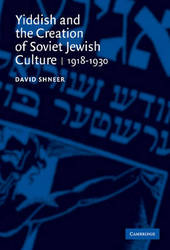
|
Yiddish and the Creation of Soviet Jewish Culture: 1918-1930
Hardback
Main Details
| Title |
Yiddish and the Creation of Soviet Jewish Culture: 1918-1930
|
| Authors and Contributors |
By (author) David Shneer
|
| Physical Properties |
| Format:Hardback | | Pages:312 | | Dimensions(mm): Height 229,Width 152 |
|
| Category/Genre | World history - from c 1900 to now
Judaism |
|---|
| ISBN/Barcode |
9780521826303
|
| Classifications | Dewey:947.004924 |
|---|
| Audience | | Professional & Vocational | |
|---|
| Illustrations |
10 Tables, unspecified; 5 Line drawings, unspecified
|
|
Publishing Details |
| Publisher |
Cambridge University Press
|
| Imprint |
Cambridge University Press
|
| Publication Date |
13 February 2004 |
| Publication Country |
United Kingdom
|
Description
Yiddish and the Creation of Soviet Jewish Culture gives voice to the Soviet Jewish activists empowered by the state to create a Soviet Jewish national culture. Jewish activists were interested in building a Soviet Jewish culture because they were striving for a national revolution - the creation of a new culture through which Jews would identify as Jews on new, secular, Soviet terms. This book explores the ways in which Jews were part of, not apart from, the Soviet system and Jewish history. Soviet Jewish culture worked within contemporary Jewish national and cultural 1920s trends and simultaneously participated in the larger project of propagating the Soviet state and ideology. Soviet Jewish activists were not nationalists or Soviets, but both at once. David Shneer addresses some of the painful truths about the Jews' own implication and imbrication in the system and places his analysis in the context of wider twentieth-century culture.
Reviews'Shneer's history is an important contribution not only to Soviet (and Russian) history (and most especially Soviet nationality policy and politics) but at least as much (if not more) to Jewish history, which, as he correctly argues, has been reluctant to consider the Russian and Soviet chapters of Jews' communal and intellectual history as anything but victimology and part of the overall history of the Holocaust. He brings to the project a wide reading in the contemporary press and published sources, enhanced by recently accessible archives in Russia and Ukraine. I found particularly attractive David's ability to bring to life several of the key players in this story of Jewish cultural and intellectual politics in the 1920s and his reluctance to pigeonhole them (and himself) in many of the stereotypically conventional ways that historians before him have done. Moreover, very few scholars who write on these matters, and especially representatives of the younger generation, command David's mastery of Yiddish-, Hebrew-, and Ukrainian-language sources.' Mark von Hagen, author of: Soldiers in the Proletarian Dictatorship: The Red Army and the Soviet State, 1917-1930 (Cornell University Press, 1993) and Co-Editor: After Empire: Multiethnic Societies and Nation-Building (Westview Press, 1997) '... a detailed and insightful study.' Journal for the Study of the Old Testament '... sensitive and well-argued ...' The Slavonic and East European Review
|